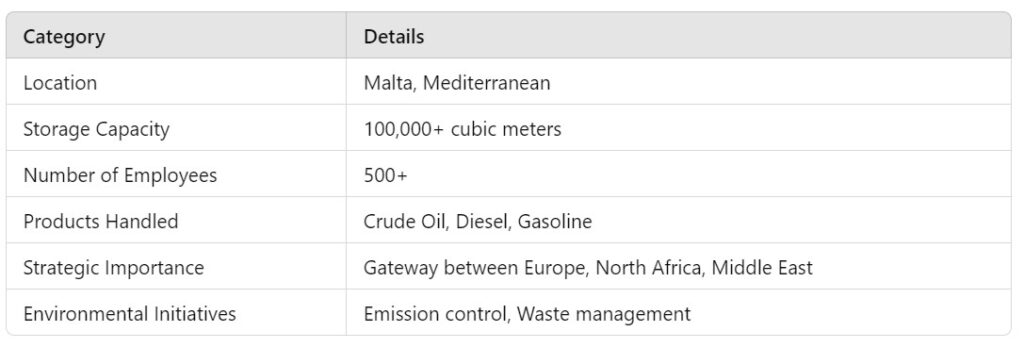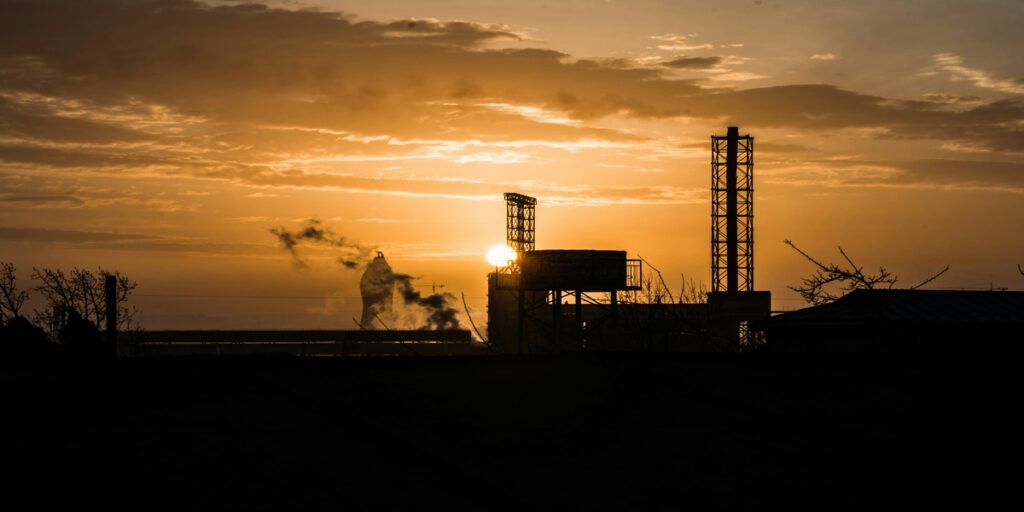Introduction:
Ras Hanzir Oil Terminal Limited, located in Malta, is a key player in the Mediterranean’s oil and gas industry. It plays a crucial role in oil storage, refining, and transportation, supporting both local and global energy markets. This article will explore the terminal’s history, its significance to Malta’s energy infrastructure, operational functions, and future outlook. Additionally, we will look at its environmental impact and sustainability efforts.
History of Ras Hanzir Oil Terminal Limited
Ras Hanzir Oil Terminal Limited has a history that dates back to Malta’s strategic importance during World War II. Positioned on the Grand Harbour, it was originally used as a fueling station for military and merchant ships. After the war, it evolved into a major storage facility for petroleum products. This shift played a significant role in the growth of Malta’s energy sector.

Strategic Importance in the Oil and Gas Sector
Ras Hanzir Oil Terminal Limited is strategically located in the Mediterranean, making it vital to the global oil supply chain. It serves as a hub between Europe, North Africa, and the Middle East, facilitating the distribution of crude oil and refined petroleum. Companies use the terminal to store large quantities of oil before distributing them to different markets.
Its central position gives it a unique advantage in fueling nearby countries. The terminal’s storage and refining capabilities have made it a valuable partner for global oil corporations. As a result, Ras Hanzir plays a key role in ensuring energy security for the region.
Operational Capabilities and Infrastructure
The terminal boasts modern infrastructure, with storage capacity exceeding 100,000 cubic meters. It is equipped to handle various types of crude oil and refined products. The terminal also provides ship-to-ship transfer, loading, and unloading services. Additionally, its blending capabilities allow for the customization of products to meet market demands.
Key Functions:
- Storage: The terminal stores various grades of oil in large tanks.
- Refining: It refines crude oil into usable products.
- Transportation: The terminal facilitates the transport of fuel to Europe, North Africa, and beyond.
- Quality Control: Strict monitoring systems ensure all products meet high standards.
The terminal also supports related services like maintenance and safety training, which are in line with international safety standards.
Environmental Impact and Sustainability Efforts
Operating in the oil industry presents environmental challenges. Oil Terminal Limited has made efforts to minimize its environmental impact. It has invested in energy-efficient technologies and adopted greener alternatives for fuel handling.
The terminal’s environmental policy includes:
- Emission Control: Filtration and vapor recovery systems reduce the release of harmful gases.
- Waste Management: The terminal follows strict protocols for recycling oil residues and disposing of hazardous materials.
- Water Conservation: Efficient systems minimize water consumption during operations.
Economic Impact and Employment
Ras Hanzir Oil Terminal Limited plays a vital role in Malta’s economy by generating revenue and creating jobs. The terminal directly employs over 500 workers and indirectly supports thousands of jobs in related industries. Its operations in shipping, maintenance, and logistics are key to the economic ecosystem.
Additionally, Ras Hanzir acts as a major hub for international trade, reinforcing Malta’s status as a center for maritime commerce in the Mediterranean. The terminal’s operations have attracted foreign investment, helping to boost infrastructure and Malta’s GDP.
Future Prospects and Expansion Plans
Ras Hanzir Oil Terminal Limited is focused on modernization and expanding its capacity. Planned upgrades include:
- Increased Storage: The terminal will expand its tank capacity to meet growing demand.
- Renewable Energy: The terminal is exploring solar and wind energy options to power some operations.
- Digital Transformation: Implementing smart technology will improve efficiency and real-time monitoring.
These initiatives will keep Ras Hanzir competitive in the global oil market.
Infographic: Key Data on Ras Hanzir Oil Terminal Limited

The table summarizes key facts about Ras Hanzir Oil Terminal Limited. It highlights the terminal’s capacity, employee count, and environmental efforts.
FAQs
- What is Ras Hanzir Oil Terminal Limited?
Ras Hanzir is an oil storage and refining hub in Malta, strategically positioned in the Mediterranean. - Why is Ras Hanzir important in the oil industry?
Its location allows it to serve as a gateway for oil distribution between Europe, Africa, and the Middle East. - How does Ras Hanzir promote sustainability?
The terminal reduces emissions, manages waste, and conserves water through efficient systems. - What are the terminal’s future plans?
The terminal plans to increase storage, adopt renewable energy, and implement smart technology. - What is Ras Hanzir’s impact on Malta’s economy?
Ras Hanzir generates jobs, attracts investment, and boosts Malta’s status as a trade hub. - How does Ras Hanzir ensure safety?
The terminal follows strict safety guidelines and conducts regular training and inspections.
Conclusion
Ras Hanzir Oil Terminal Limited is a key player in the Mediterranean energy sector. Its strategic location, coupled with its modern infrastructure, allows it to offer top-notch services in oil storage, refining, and distribution. Through sustainability initiatives and future expansion plans, Ras Hanzir is set to remain an essential part of Malta’s energy and economic landscape.’






